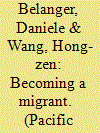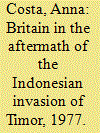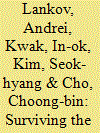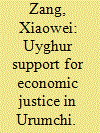|
|
|
Sort Order |
|
|
|
Items / Page
|
|
|
|
|
|
|
| Srl | Item |
| 1 |
ID:
119052


|
|
|
|
|
| Publication |
2013.
|
| Summary/Abstract |
This article discusses the role played by neo-conservative intellectuals during the tenure of Malaysia's fifth prime minister, Abdullah Ahmad Badawi (2003-2009). Abdullah's leadership was distinguished by two qualities which arguably qualify it as "neo-conservative," in terms of revival of policies from a bygone era and the launching of political reforms within the framework of a conservative regime led by the ruling United Malays National Organization (UMNO) party. Using the theoretical experiences of dominant conservative regimes in the Soviet Union, Japan, China and Taiwan, the present authors are of the view that the policies and approach undertaken by Abdullah constitute a sharp departure from those of his predecessor, Mahathir Mohamad, for twenty-two years (1981-2003). Particularly eliciting controversy was the trust Abdullah put into a team of young advisors led by his son-in-law, Khairy Jamaluddin. In this article, we look at how these young neo-conservative intellectuals, together with several identifiable individuals, brought about reforms in Abdullah's leadership and
impacted UMNO politics.
|
|
|
|
|
|
|
|
|
|
|
|
|
|
|
|
| 2 |
ID:
119050


|
|
|
|
|
| Publication |
2013.
|
| Summary/Abstract |
Since the early 1990s several million men and women from Southeast Asia's lower socioeconomic classes have migrated to East Asia with a temporary worker visa or a spousal visa. This article is based on five years of ongoing fieldwork in migrants' communities of origin in rural Vietnam and in places of destination in Taiwan, South Korea and Japan. The authors make three contributions: first, they argue that the categorization of migrants as either "workers" or "wives" in research obscures the complex trajectories and motives involved in the process of "becoming a migrant." Second, they challenge studies that unquestioningly invoke social network approaches to migration. Instead, social networks should be regarded as a double-edged sword for emigrants because personal networks are embedded in a powerful migration industry. Third, they contend that migration outcomes and levels of success are, in part, influenced by processes taking place before departure. This article sheds light on the tension between migrants' agency and the structural constraints faced by candidates seeking to migrate from Vietnam, and from Southeast Asia more broadly.
|
|
|
|
|
|
|
|
|
|
|
|
|
|
|
|
| 3 |
ID:
119053


|
|
|
|
|
| Publication |
2013.
|
| Summary/Abstract |
This article fills a gap in the literature of international involvement in the aftermath of the Indonesian invasion of Timor-Leste by providing detailed documentary analysis of British conduct and motives. A substantial amount of scholarship has covered the role played by the United States and Australia during and after the Indonesian invasion of 1975. The lack of scholarly work specific to the role played by Britain during the first years of the Indonesian-Timorese conflict is regrettable as it represents a missing piece in the mosaic of international liability for one of the major massacres committed in the twentieth century. This omission has allowed the official British government version to survive, in which the country plays the role of an honest but ultimately unsuccessful broker working for a diplomatic solution between Indonesia and Portugal that would ensure the right to self-determination for Timor. The existing literature only offers a cursory challenge to this idea of British neutrality.
|
|
|
|
|
|
|
|
|
|
|
|
|
|
|
|
| 4 |
ID:
119051


|
|
|
|
|
| Publication |
2013.
|
| Summary/Abstract |
The article deals with the everyday survival strategies employed by the workers of (largely non-functioning) state enterprises in post-socialist North Korea, and with the social changes this group has dealt with in the last two decades. It also compares these trends with the experiences of post-socialist Eastern Europe. In the 1990s the economic role of the North Korean state decreased dramatically. Official wages could no longer guarantee the physical survival of the populace, so workers from state industries engaged in a multitude of economic activities which were (and still are) largely related to the booming "second economy." These activities include private farming, employment in semi-legal and illegal private workshops, trade and smuggling, as well as small-scale business activities. The choice of a particular activity depends on a number of factors, of which network capital is especially significant. Income is also augmented by the illegal use of state resources and widespread theft of material and spare parts from state-owned factories. As a result of these changes, the industrial working class of North Korea, once a remarkably homogenous group, has fragmented, and its members have embarked on vastly different social trajectories.
|
|
|
|
|
|
|
|
|
|
|
|
|
|
|
|
| 5 |
ID:
119049


|
|
|
|
|
| Publication |
2013.
|
| Summary/Abstract |
There has been little research conducted on economic beliefs among Uyghurs in Xinjiang, although they are part of the reason Uyghurs have developed feelings of relative deprivation and unfairness. Do most Uyghurs support economic individualism, which holds that the poor are responsible for their misfortunes, economic inequality is good, and the government should not interfere in the economy? Or do they endorse economic communitarianism, which holds that the government shall provide for the poor and reduce inequality via intervention? Are there some people in the Uyghur community who are more economically communitarian than others? Are Uyghur economic beliefs related to the usual socio-demographic measures such as age, sex, education, occupational attainment and income? Is there a religious influence on Uyghur economic attitudes? If not, how can Uyghur economic preferences be accounted for? This paper addresses these questions using data from a survey conducted in Ürümchi in 2007. It shows that the vast majority of Uyghurs endorse economic communitarianism. In addition to Islamic orthodoxy, Uyghur consciousness is related to this endorsement. However, Uyghur socioeconomic status is not correlated with their economic preferences. This is partly because Uyghur-Han inequality affects Uyghur attitudes more than intra-group differentiation in social status among Uyghurs.
|
|
|
|
|
|
|
|
|
|
|
|
|
|
|
|
|
|
|
|
|